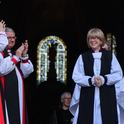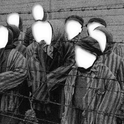Because I was a librettist before I was a priest, I find myself occasionally on stage taking a bow. The performers will have bowed first: the singers and dancers, then the principals in front by themselves. Then they’ll go offstage into the wings, and return for a second bow. That’s when the director, choreographer and conductor join the curtain call, and then the composer and I run onstage. Look right and left. Bow from the waist. Applaud the orchestra. Bow again.
I spent a lot of time thinking about theatre. My old colleague Peter Sellars has always been a little unusual among directors in his attention to ritual gestures. Why do you notice that man putting his hand on that other man’s shoulder at a certain point in the performance? Something in the unfolding of all that has happened onstage up to this point has focused your mind on this moment.
In church there are similar rituals. How do you hold your hands when you pray? Pointy fingers with thumbs crossed, or the more relaxed Cuddesdon clasp? When and how do you bow? What do you wear? The vestments I wear do the same work as a Commedia dell’arte costume: in them I become “the priest at mass”. You’d be mistaken if you thought that ritual only features in High Church shacks. All churches have ritual. When do you raise your hands? How does a Quaker meeting end? How do you stage an altar call? When do you speak in tongues?
Listen and watch. On 25th April, I got up at an ungodly hour to catch a train to London and another to Canterbury. By the time we left St Pancras we were something of a party, all going to the consecration of the new bishop of Edmonton, the suffragan or assistant bishop for northwest London. The main thing I knew about the ceremony was the old joke about the moment when all the bishops cluster round the new bishop, reach out their hands in an important ritual gesture and remove the new bishop’s spine.
The new bishop, Anderson Harris Mithra Jeremiah, is someone with whom I’ve laughed and at whose table I’ve been fed. His wife is a friend. His children’s pictures are on my windowsill. Anderson was ordained in the Church of South India. Never before has a priest ordained in that church been consecrated as a bishop in the Church of England. It goes deeper than that, though. Anderson is a Dalit Christian, who experienced from earliest childhood what it means to be untouchable, a pariah. His theology is grounded in the experience of being an outcast. His spine is not removable.
Here are some of the things I noticed.
The archbishop of Canterbury had a cough and seemed tired, but that didn’t matter—the focus was elsewhere. The first lesson was read by one of Anderson’s daughters. One of his sisters read the second lesson in Tamil. Then the drumming began, sharp and loud. Four Dalit drums announced the gospel reading. The hair on the back of my neck stood up. Dalit drums, parai, coming down from the top of the quire, the heart of Canterbury Cathedral. That was a moment. The canon theologian of Washington National Cathedral, Kelly Brown Douglas, preached an acrostic sermon in which the “O” in LOVE stood for being “outcast-oriented”. You couldn’t help but notice the many, many voices and accents, all speaking clearly, the gorgeous saris that Anderson’s sisters were wearing, and the scarlet rochets of the bishops as they went up to the altar while Anderson knelt before the archbishop for the act of consecration.
The archbishop laid his hands on Anderson’s head. The bishops who could reach him laid their hands on his shoulders and his back; the ones on the outside of the group laid their hands on the shoulders of the ones in front. Three bishops stood aside to make clear that this was one step too far for them. That was a moment, too. I wondered how much it weighed upon them that they were characters in a drama about outcasts being brought in and those who have been considered untouchable receiving the Holy Spirit through the laying on of hands.
But the moment passed. The Dalit drums got the last word.













